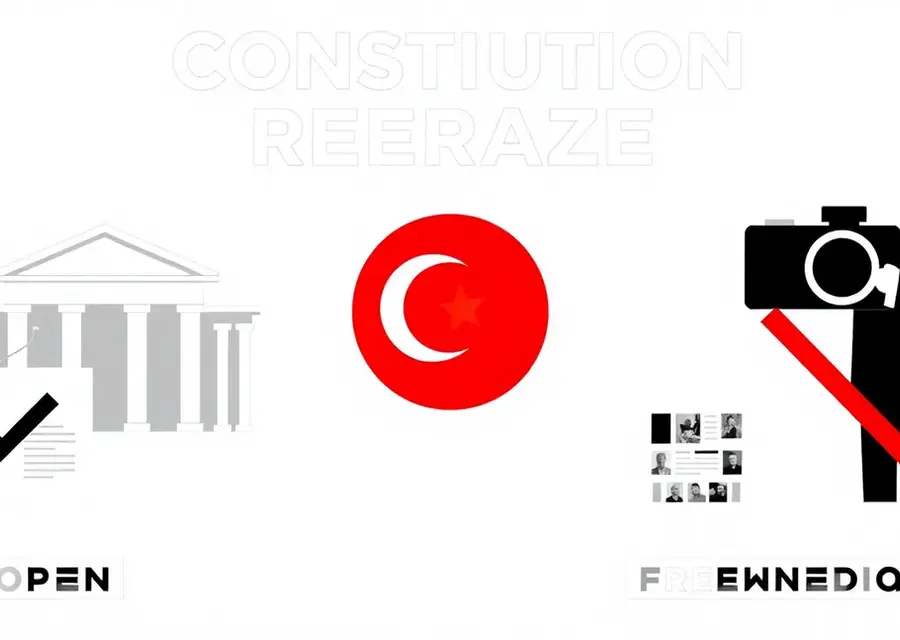Unpacking the Azerbaijan Referendum 2009: Term Limits and Press Freedom
- THE MAG POST

- Aug 24
- 7 min read

The 2009 constitutional referendum in Azerbaijan marked a significant turning point, presenting voters with a series of proposed amendments that would fundamentally alter the nation's governance. At the forefront of these changes was the controversial proposal to abolish presidential term limits, a move initiated by the administration of President Ilham Aliyev. This decision immediately ignited a robust debate, both domestically and internationally, concerning the future of democratic institutions and the balance of power within the country. The referendum also included measures that would significantly impact press freedom, further intensifying discussions about civil liberties and the role of media in a democratic society. Understanding the nuances of this referendum is key to grasping the political trajectory of Azerbaijan in the subsequent years.
Understanding the 2009 Azerbaijan Constitutional Referendum
The landscape of democratic governance is often shaped by pivotal moments, and the 2009 constitutional referendum in Azerbaijan stands as one such significant event. This national vote, held on March 18, 2009, presented citizens with a series of proposed amendments to their constitution. At the heart of the public discourse were measures that promised to redefine the boundaries of executive power and the scope of public expression. The referendum, initiated under the leadership of President Ilham Aliyev, sought voter approval for twenty-nine distinct changes to the foundational legal document of the nation.
The Core of the Controversy: Presidential Term Limits
Among the twenty-nine proposed amendments, the proposal to abolish existing presidential term limits generated the most intense debate and international scrutiny. This particular measure was designed to allow President Ilham Aliyev, who had already served two terms, to seek re-election indefinitely. The implications of such a change were profound, potentially altering the long-term trajectory of Azerbaijan's political system and raising questions about democratic succession and the balance of power.
Abolishing Presidential Term Limits: The Debate
The decision to propose the removal of presidential term limits was a bold move that immediately drew attention from international observers and human rights organizations. Proponents argued that such a change would provide necessary stability and continuity in leadership, allowing the president to continue implementing long-term development strategies without interruption. They posited that the effectiveness of the leader should be the primary determinant of their tenure, rather than arbitrary time constraints. Furthermore, it was suggested that an experienced leader could better navigate complex geopolitical challenges and foster economic growth, making an extended term beneficial for the nation's progress and security.
Conversely, critics voiced significant concerns that removing term limits could pave the way for authoritarianism and undermine democratic principles. They argued that term limits are a crucial safeguard against the concentration of power and ensure regular opportunities for political renewal and accountability. The potential for a leader to become entrenched, unresponsive to the will of the people, or to foster a cult of personality was a primary worry. International bodies, including the Venice Commission of the Council of Europe, expressed reservations, noting that abolishing term limits could be seen as a step backward for democratic achievements, potentially eroding the checks and balances essential for a healthy democracy.
The arguments against the removal of term limits often highlighted the importance of a vibrant opposition and the need for diverse perspectives in governance. It was contended that a continuous leadership could stifle political competition and prevent new ideas from emerging. The experience of other nations where similar measures had been implemented was often cited as a cautionary tale, pointing to potential increases in corruption and a decline in civil liberties. The Azerbaijani opposition also voiced strong disapproval, viewing the move as an attempt to consolidate power and perpetuate a single political lineage, rather than serving the broader interests of the citizenry.
The implementation of this amendment had a direct impact on the subsequent political landscape. Following its passage, President Ilham Aliyev was indeed able to run for and secure a third term in the 2013 presidential elections. This solidified his position and continued his leadership, a direct consequence of the referendum's outcome. The long-term effects of this decision on Azerbaijan's governance, political culture, and international relations remain a subject of ongoing analysis and discussion among political scientists and observers.
Impact on Press Freedom and Media Landscape
Beyond the critical issue of presidential tenure, the 2009 referendum also included measures aimed at significantly curtailing press freedom. This aspect of the vote raised alarms among advocates for free expression and independent media, who viewed it as an attempt to consolidate control over the narrative and limit public discourse. The proposed restrictions on media operations were seen as a direct challenge to the principles of transparency and open communication essential for a functioning democracy.
Defining the Boundaries of Media Expression
The specific provisions within the referendum that addressed press freedom were meticulously crafted to grant the state greater authority over media content and operations. These measures were interpreted by many as an effort to stifle critical reporting and ensure that public discourse remained aligned with the government's agenda. The potential for increased censorship and the suppression of dissenting voices was a major concern for civil society organizations and journalists operating within Azerbaijan, as well as for international bodies monitoring media freedom globally.
The implications of restricting press freedom extend far beyond the immediate control of information. A free and independent press serves as a vital watchdog, holding power accountable and informing the public on critical issues. When this freedom is curtailed, it can lead to a less informed citizenry, a reduced capacity for public debate, and a greater susceptibility to misinformation. The referendum's measures in this area were seen as a move to create a more controlled information environment, where alternative viewpoints might be marginalized or silenced, thereby impacting the overall health of the democratic process.
The international community, particularly organizations dedicated to press freedom, closely monitored these developments. Concerns were raised about the potential impact on Azerbaijan's international standing and its commitment to democratic norms. Reports from various human rights groups often highlighted a pattern of pressure on independent media outlets and journalists in the years leading up to and following the referendum, suggesting a deliberate strategy to shape the media landscape according to governmental preferences.
The measures related to press freedom were intended to provide a legal framework for tighter state control over media content. This included potential restrictions on reporting critical of the government, limitations on foreign media influence, and increased oversight of journalistic activities. Such a regulatory environment can foster self-censorship among journalists, who may fear repercussions for reporting on sensitive topics, further limiting the diversity of voices and perspectives available to the public.
Analysis of the Referendum's Outcomes and Turnout
The official results of the 2009 Azerbaijani constitutional referendum indicated a decisive victory for the proposed amendments. Voter turnout was reported at approximately 71.08%, a figure that suggests a substantial portion of the electorate participated in the vote. The measures themselves received high approval ratings, with reported percentages ranging from 87.14% to 91.76% in favor, while disapproval figures were between 4.59% and 7.24%. Invalid votes constituted a smaller but notable portion, ranging from 3.64% to 5.70%.
Interpreting the High Approval Ratings
The exceptionally high approval ratings for the constitutional amendments in the 2009 referendum have been a subject of considerable analysis and debate. While the government presented these results as a clear mandate from the people, international observers and opposition groups raised significant concerns regarding the integrity of the electoral process. Allegations of fraud and irregularities cast a shadow over the reported outcomes, leading to questions about the genuine will of the electorate being reflected in the final figures. The wide disparity between the official results and the assessments of independent monitors highlighted potential issues with transparency and fairness.
The context in which the referendum was held is crucial for understanding these results. Azerbaijan, under President Ilham Aliyev, has often been described as an authoritarian or semi-authoritarian state by various international organizations. In such environments, electoral processes can be influenced by state control over media, limitations on political opposition, and potential manipulation of results. Therefore, while the reported figures indicate overwhelming support, the underlying conditions of the vote make it difficult to accept these numbers at face value without independent verification and a thorough investigation into any reported malpractices.
The measures passed in the referendum, particularly the abolition of presidential term limits and the restrictions on press freedom, had immediate and long-term consequences for Azerbaijan's political system. The ability of President Aliyev to seek further terms fundamentally altered the dynamics of presidential succession and political competition. Similarly, the impact on media freedom created a more challenging environment for independent journalism and critical reporting, potentially shaping public perception and political discourse for years to come. The referendum thus served as a critical juncture in the country's political evolution.
The high turnout, while seemingly indicative of civic engagement, also needs to be considered within the broader political context. In countries with strong executive power, there can be significant pressure on citizens to participate in elections and demonstrate support for the ruling government. This can be achieved through various means, including state-organized campaigns encouraging voting and the portrayal of participation as a patriotic duty. Therefore, the reported turnout, like the approval ratings, warrants careful consideration of the surrounding political environment and potential influencing factors.
International Condemnation and Legal Scrutiny
The 2009 constitutional referendum in Azerbaijan did not go unnoticed by the international community. Several prominent international bodies and legal experts voiced strong criticisms regarding the nature and implications of the proposed amendments, particularly those concerning presidential term limits and press freedom. These critiques often centered on Azerbaijan's adherence to democratic principles and international human rights standards.
The Venice Commission's Stance
Key Measure | Reported Approval | Concerns Raised |
Abolition of Presidential Term Limits | 87.14% - 91.76% | Potential for authoritarianism, undermining democratic succession, Venice Commission criticism, violation of international law principles. |
Restrictions on Press Freedom | 87.14% - 91.76% | Concerns over censorship, suppression of dissent, impact on independent media, challenge to transparency and public discourse. |
Overall Referendum Conduct | 71.08% Turnout | Allegations of fraud and irregularities, questions about electoral integrity, concerns over transparency and fairness. |
Legal Opinion on Amendments | N/A | Professor Wojciech Sadurski noted violations of transparency and European Convention on Human Rights. |






















































Comments